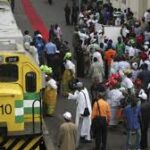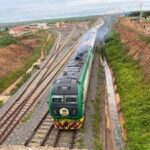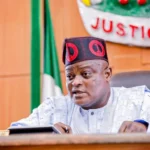Special needs children: Enhancing inclusive learning experience in Oyo State
By Ibukun Emiola, News Agency of Nigeria (NAN)
Rofiah Oyekunle is a 13-year-old special girl with a deep-seated desire to become a teacher in the future.
Her physically challenged status notwithstanding, Rofiah shows no sign of submitting this precious dream to her disability.
Perhaps, being a pupil of Basic Special School, Adeoyo, Ring Road, Ibadan, is just the fuel she needs to keep believing in herself.
Of course, she reckons herself fortunate, knowing that her colleagues, unprivileged to attend special schools, have to stay back at home to watch their dream turn to a nightmare.
With this in mind, Rofiah’s determination to sail through the storms of disability became so endearing, as testified by Mrs Ganiyat Alabi, the headmistress of her school.
“That girl, if she writes or speaks for you, you will like it and adore her.
“Though she’s on a wheelchair with crippled hands, yet she writes, and she is intelligent,” said the proud headmistress.
Alabi, desiring more pupils in Rofiah’s standard, especially in Oyo State, said removing certain learning limitations would further aid the educational inclusiveness of Persons with Disabilities (PWDs).
She mentioned the long-distance pupils with disabilities had to travel to reach school, necessitating the need to reduce school days to two or three days per week.
“There are some pupils with disabilities who need to be stable and be around the school so that educating them will be easier than coming from home.
“So, distance is one of the challenges as well.
“There are some parents who have these children at home, but the stigmatisation and distance of taking them to school are barriers.
“It’s tough, especially when they look at the transportation fare, as they may have to spend between N3,000 and N4,000 daily.
“So, if you see some pupils once or twice per week, you should thank God that they could make it,” the headmistress said.
Alabi also identified the lack of personnel for different categories of disabilities present in special schools as another challenge facing inclusive learning.
The headmistress stated that there should be different classes for different disabilities to aid learning.
“Putting all of them together in the same classroom will jeopardise their learning because they are not all the same in terms of their disabilities and their degrees.
“For instance, those with autism see the world differently, but once we identify them and discover what interests them, we make that our focus.
“And sometimes, because some may be violent and disturb others, we ought not to put all of them together,” Alabi said.
While commending the state government for recently recruiting four special-needs teachers and non-teaching staff to the school, she asked for more intervention.
According to her, the lack of enough classrooms, teaching aids, boarding facilities, and teaching and non-teaching personnel constitutes a huge setback to inclusive learning.
“Sure, despite the new additional hands, we still need more teaching and non-teaching staff, and we need a hostel to be erected in the school compound.
“We have the space for that, and presently, we operate a temporary boarding facility which started in March but can only accommodate 20 out of the about 67 pupils we have,” Alabi said.
The News Agency of Nigeria (NAN) recalls that the nation’s Universal Basic Education (UBE) policy aims to make education accessible to all children, regardless of location or socio-economic background.
One of UBE’s objectives is to reduce the distance between schools and communities, making it easier for children to access education.
Findings, however, revealed that only 15 out of 33 Local Government Areas (LGAs) in the state have schools for pupils with special needs.
Ibadan has nine such schools, comprising both public and private schools.
The situation is heightened by the lack of a policy framework, such as the gender-responsive Education Sector Plan (ESP) in Oyo State.
This is a means to ensure every child, irrespective of gender, accesses good and quality education without any form of barrier.
So, having an ESP in the state has become imperative for the inclusion of children with special needs who are currently out of school.
A parent of a pupil with special needs, Mrs Anna Ogundipe, said she didn’t mind the stress of taking her child to a government-owned special needs school, despite the long distance.
“We live at Yemetu in Ibadan, and because of schooling, my daughter, with a hearing impairment, has to change from the regular school to a special school for the deaf at Eleyele.
“At first, I thought if she was amid those who could speak, it would help her to hear and speak, but when her condition was worsening, I didn’t mind the distance.
“I enrolled her at the Ibadan School for the Deaf, and her condition greatly improved over a short period.
“I believe it will still be better,” Ogundipe said optimistically.
Also, Mrs Oladunni Adepoju, Headmistress, Sabol International School for the Physically Challenged, reiterated the need for massive government support.
According to her, many of the children are locked away in their homes because of the negative attitude of parents and society.
“If we do not care and make provisions for them to show they are part of society, then we’ll have many more of them becoming useless and unable to contribute to the country’s development, despite their disabilities,” she said.
Attesting to the various government interventions at the federal and state levels in the school, Adepoju called for special funds for the education, feeding, and basic healthcare of special needs children.
Meanwhile, Mr Femi Ajulo, Chairman, Joint Association of Persons with Disabilities (JONAPWD), said the Oyo State Government had ensured the inclusion of PWDs in many of its programmes.
“Regrettably, while the government had included people with disabilities in its free education policy, many are still left at home with no access to education because of shame or stigmatisation,” he said.
According to Ajulo, there are about five to six schools for various categories of PWDs in the state.
“This has made it easy for them to get educated.
“The government has also provided a vocational centre for PWDs with a boarding facility, but it cannot accommodate everyone,” he said.
Ajulo believes the state ESP ensures inclusion and support for PWDs.
According to him, the government has promised to pay 10 per cent of the cost of schooling for PWDs attending private schools.
“Those who want their wards educated may not mind putting them in boarding facilities to reduce the distance challenge,” he said, acknowledging distance as a critical barrier to accessing education in the state.
Meanwhile, the Oyo State Commissioner for Education, Prof. Salihu Adelabu, said the government has a very elaborate framework for the different categories of PWDs.
“We are thinking of inclusive education, and a lot of things are in place too; any time soon, it will be seen.
“What we are doing right now is to try and map where they are, how many of them are in schools, and how many are not in schools,” Adelabu said.
He said the government aims to bring those out of school back to school with different types of programmes outlined for them. (NANFeatures)
****If used, please credit the writer and the News Agency of Nigeria (NAN)
Published By
-
Deputy Editor in Chief,
Multimedia, Solutions Journalism & Website.
Has also recently published
 General NewsJuly 11, 2025FG urged to link Warri-Itakpe rail to inland ports, road networks
General NewsJuly 11, 2025FG urged to link Warri-Itakpe rail to inland ports, road networks General NewsJuly 11, 2025Why NRC suspends railway operations in Niger
General NewsJuly 11, 2025Why NRC suspends railway operations in Niger  MetroJuly 11, 2025Railway tracks in Umuahia not vandalised- NRC official
MetroJuly 11, 2025Railway tracks in Umuahia not vandalised- NRC official General NewsJuly 11, 2025Lagos assembly moves to regulate marriages
General NewsJuly 11, 2025Lagos assembly moves to regulate marriages





